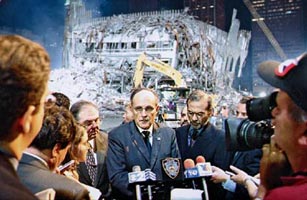
(8 of 11)
Father and Son
By conventional standards, Harold Giuliani was not a great man. In 1934, at age 26, he was arrested for robbing a milkman at gunpoint in the vestibule of a Manhattan apartment building. A court-appointed psychiatrist diagnosed him as an "aggressive, egocentric type." He served a year and a half, then went to work as a bartender and enforcer for his brother-in-law Leo D'Avanzo's loan-sharking operation, according to court documents and eyewitness accounts uncovered by Giuliani biographer Barrett. In 1944, Harold's wife Helen, a smart, serious-minded woman (still living but suffering from senility), gave birth to Rudy, their only child.
Giuliani says he knew only a little of his father's history. "I knew parts of it, but it was always a big secret and very shadowy. I knew he had gotten into trouble as a young man, but I never knew exactly what it was" until Barrett broke the story in 2000. "As I found out more about what his history was and what he had done," he says, emotion swamping his syntax, "having been his son, the way he brought me up, I have this tremendous respect for him."
Bad guy, good dad — Harold Giuliani did everything he could to ensure that his son didn't end up the way he did. "I'd like to find a better way to describe it, but I have to do it in psychological terms," Giuliani says. "My father compensated through me. In a very exaggerated way, he made sure that I didn't repeat his mistakes in my life — which I thank him for, because it worked out." To separate his boy from the outlaw wing of the family, Harold moved his family from Brooklyn to the Long Island community of Garden City, N.Y., when Rudy was seven. "He would say over and over, 'You can't take anything that's not yours. You can't steal. Never lie, never steal.' As a child and even as a young adult, I thought, What does he keep doing this for? I'm not going to steal anything."
Harold had a good head for figures and did tax returns for people in the family. "He'd make out returns until 3 or 4 in the morning," Giuliani says, "and I'd ask him, 'Don't you hate doing this?' He would give me this long lecture: 'It's a great privilege to pay your taxes, and you should overpay your taxes' — which I do, actually — 'and just think of all those people who would like to come to America just to have the privilege to pay taxes. Better pay every single penny of them. And better make sure you don't take anything that doesn't belong to you.' As I got older, I started to realize what it was about. It was extremely conscious, well thought out. And very overdone."
Giuliani's closest friends from those days, Placa and Peter Powers, who went on to become Giuliani's campaign manager and first deputy mayor, both say they had no idea about the criminal ties. "His parents brought him up with strong values," says Powers. "The dinner-table talk with his aunts and uncles was always heated politics — his Uncle Rudy and I were Goldwater conservatives, and the rest were liberals. Rudy was a Kennedy Democrat."
"From the time I was very young, bravery and courage inspired me," Giuliani says. "My father had great physical courage. He had been a boxer. I read John Kennedy's Profiles in Courage when I was young. My Uncle Rudy, my father's youngest brother, was a police officer for 24 years. My mother's second youngest brother, Edward, was a captain in the fire department, decorated four or five times. She had three other brothers who were police officers. So I grew up with uniforms all around me and their stories of heroism." But once past the age of eight, Giuliani never thought about becoming a cop. "I wanted to be a priest, I wanted to be a doctor, I wanted to be an Air Force pilot." He was a chubby kid. He didn't get the best grades. But he was an organizer, a class politician, shrewd from an early age. "Giuliani was always around, always leading something, always looking ahead," says Powers. He developed an abiding interest in opera — getting Placa and Powers to form a club and travel into Manhattan for performances of the Metropolitan Opera — but he couldn't sing.